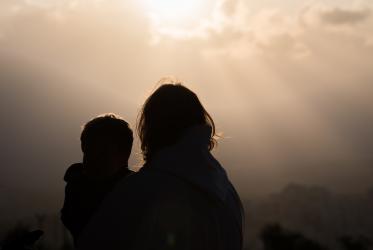This document is also available in Arabic, French, German and Spanish.
Joint Communique
issued by the delegations representing
the Muslim Council of Elders and the World Council of Churches
at the meeting held
26 April 2017
Cairo, Egypt
The second meeting of a delegation of the Muslim Council of Elders led by the Grand Imam of Al-Azhar, His Eminence Professor Dr Ahmad al-Tayyeb, and a delegation of the World Council of Churches (WCC) led by Dr Agnes Abuom, Moderator of the Central Committee of the WCC and Rev. Dr Olav Fykse Tveit, General Secretary, took place at Al Azhar, Cairo, Egypt, 26 April 2017. Dr al-Tayyeb opened the gathering by welcoming the World Council of Churches to this important meeting which was taking place at a critical time in the history of the Middle East and the world.
The theme of the discussion at the meeting was ‘The Role of Religious Leaders to Promote Initiatives on Citizenship and Peaceful Co-existence’.
Each delegation presented three speeches which explored this area. The papers were followed by a discussion in which all members of the delegations were able to participate.
The speeches made by the delegation of the Muslim Council of Elders were presented by:
- H.E. Professor Dr Ahmad al-Tayyeb, Grand Imam of Al Azhar
- Professor Dr Muhammad Quraish Shihab, Former Minister of Religious Affairs, Indonesia
- H.E. Sheikh Sayyed Ali El-Amine, former Mufti of Tyre.
The speeches made by the delegation of the World Council of Churches were presented by:
- Rev. Dr Olav Fykse Tveit, General Secretary of the World Council of Churches
- H.G. Bishop Angaelos, General Bishop for the Coptic Orthodox Church in the United Kingdom
- Professor Heidi Hadsell, President of Hartford Seminary, Connecticut, USA.
The papers highlighted how challenging was the present time, both in the Middle East and in other parts of the world, and how the problems of various different regions were impacting negatively upon each other. Given this context it had become even more important that religious leaders should work proactively rather than merely in a reactive way. An important aspect of leadership was the ability to cross boundaries, and to be able to build mutual relationships with others. The theme of the papers and the ensuing discussion, was the importance of working, in each of our respective nations, for the affirmation of the common nature of our citizenship. This should be assured through the equal rights of all. Religious leaders should promote this concept of citizenship for the benefit of all communities. We may be diverse in a number of ways, but this diversity is something to be valued and to be offered for the positive building up of our societies.
One important aspect of such necessary leadership was the fostering of education – both ensuring that educational opportunities were available for all, and facilitating greater awareness of the resources within our respective religious traditions to enable peace, and to build unity rather than hostility between people. The need for proper curricula that include information about the other communities, and the ethos of working together was discussed. Religious leaders hold a special responsibility for enabling and encouraging youth to be responsible and effective members of their various communities and their societies. We acknowledged that there were difficulties in our respective past, and sometimes mutual misunderstanding in our present, but these should not stop people of good will from working together for a peaceful future. It is important to speak about each other in an appreciative and peace-building way. It was also affirmed that it was important at times to speak in support of the other. It was especially noted that it was vital for religious people to collaborate to combat poverty, which was so often a factor in the development of violence. People have the right to lead a dignified and honourable life.
The leaders of the two delegations agreed and signed a protocol of cooperation which formally expressed their strong commitment both to continue to meet for dialogue and also to ensure that this dialogue resulted in fruitful discussions and practical expressions of working together for peace-building.
Delegation of WCC
Rev. Dr Olav Fykse Tveit
Dr Agnes Abuom
H.E. Archbishop Vassilios
H.G. Bishop Angaelos
Professor Heidi Hadsell
Ms Berit Hagen Agoy
Rev. Dr Yusuf Wushishi
Ms Marianne Ejdersten
Dr Clare Amos
Ms Carla Khijoyan
Dr Benjamin Simon
Delegation of MCE
Professor Dr Ahmed al-Tayyeb
Professor Dr Abbas Shuman
Field Marshall/Suwar Al Dhahab
Professor Dr Mahmoud Hamdi Zaqzuq
Professor Dr Muhammad Qureish Shehab
Sheikh Sayyed Ali El-Amine
Dr Adnan Al-Qattan
Dr Abu Lubaba Al-Taher Hussein
Sheikh/Abdullah Fad‘aq
Ambassador Abdelrahman Moussa
Chancellor/Mohammed Abdelsalam



